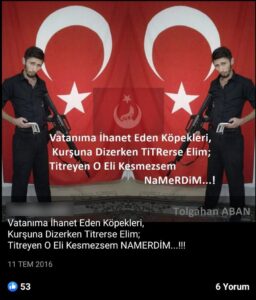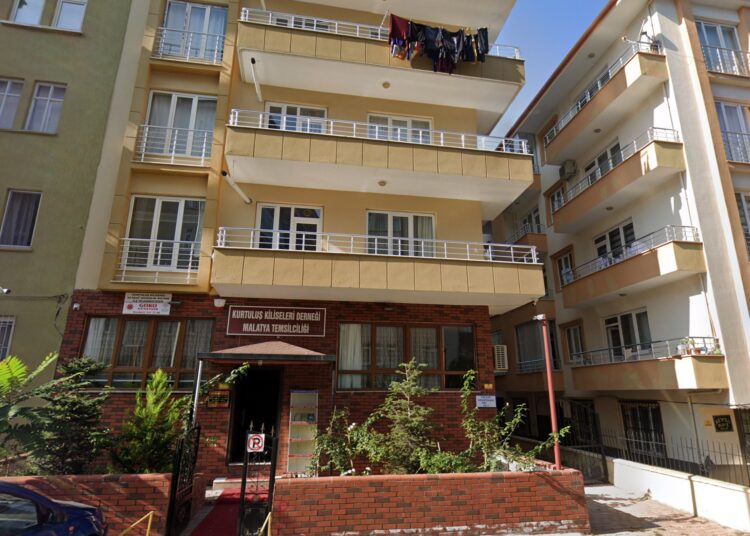Abdullah Bozkurt/Stockholm
Turkish authorities have abandoned an investigation into an alleged plot involving the recruitment of an ultranationalist Turkish figure by elements in the country’s intelligence services.
The individual was hired as an assassin to target members of a small Protestant network in the southeastern province of Malatya. The decision has raised concerns of political interference, with critics suggesting that the Islamist government of President Recep Tayyip Erdogan, which exerts significant control over the judiciary, may have influenced the outcome.
The plot unraveled when the hired assassin had a change of heart and decided to expose the scheme, revealing that he had been directed to execute the murders under the supervision of Turkish intelligence officers. The intricate details of the plan were outlined in a criminal complaint filed on September 5, 2022 with the public prosecutor’s office by Vedat Serin, the pastor and representative of the Association of Kurtuluş (Salvation) Churches Foundation in Malatya.
According to the complaint, Tolgahan Aban, a far-right figure, approached Serin in August 2022 to reveal details of the plot. Aban claimed that in 2015 notorious members of army intelligence had visited his office and instructed him to assassinate Christian missionaries.

“Civilian JİTEM members and military personnel had arrived. There was also an older individual among them. They said things like, ‘There are missionaries in Malatya. This is not good for the homeland.’ They provided the names, addresses and photos of Vedat Serin in Malatya, İhsan Özbek [chairman of the Kurtuluş Churches Association] in Ankara and Timothy Wesley Stonen [a former pastor], who previously lived in Malatya. They told them, ‘Kill these people, and we’ll give you whatever you want,’” Serin stated in the complaint.
The complaint alleges that the intelligence officers who approached Aban identified themselves as members of the Gendarmerie Intelligence Group Command (JİTEM), a covert military unit notorious for its role in extrajudicial killings and executions in the 1990s, especially in the predominantly Kurdish provinces of southeastern Turkey.
At the time Aban was serving as a local leader in the Kuyulu neighborhood of Malatya’s Yeşilyurt district for the Nationalist Movement Party’s (MHP) youth wing, Ülkücü Ocağı (also known as the Gray Wolves — Bozkurtlar — or Idealist Hearths — Ülkücüler). The MHP, which has been aligned with President Erdogan’s party in governing the country over the past decade, maintains a strong presence in Turkey’s military, police, intelligence and judicial institutions.
Aban admitted to stalking Serin for some time following his conversation with the intelligence officers. He and an associate were provided with firearms and instructed to carry out the plan at the church. However, they decided against proceeding after observing children playing computer games inside the church. A second attempt was considered but ultimately abandoned in the wake of the December 2016 assassination of Russian Ambassador Andrei Karlov by a radicalized police officer.

The turning point in Aban’s eventual abandonment of the murder plot appears to have occurred after he and his associates visited the father of Emre Günaydın, who had been convicted and imprisoned for the brutal murders of three missionaries, including German national Tilmann Ekkehart Geske, at the Zirve Publishing House in Malatya on April 18, 2007. Mustafa Günaydın, the father, claimed that his son had been manipulated and exploited by others into committing the murders and implored Aban and his associates not to proceed with their plans.
The court proceedings related to the 2007 murders revealed that they were orchestrated by the National Strategies and Operations Department of Turkey (Türkiye Ulusal Stratejiler ve Harekat Dairesi, TUSHAD), a covert intelligence unit within Turkey’s independent Aegean Army. This unit recruited operatives from both the military and civilian sectors to carry out clandestine operations for various undisclosed purposes. The personnel at TUSHAD were organized into white, black and orange units, operating with the utmost secrecy and discretion.
TUSHAD played a pivotal role in orchestrating a nationwide campaign against Christians, deliberately stoking fears that Christians were attempting to take over Turkey through missionary work. The unit disseminated propaganda and even went so far as to create a fake Protestant church. An intelligence officer was appointed as its pastor, and he later claimed to have converted back to Islam. He then began warning about the perceived dangers of Christian missionary activities in Turkey, further fueling the anti-Christian narrative.

The case was ultimately derailed by the Islamist government of President Erdogan, with the masterminds behind the murders, including a high-ranking Turkish general, avoiding criminal charges. Emre Günaydın, one of the young men manipulated into committing the murders in the name of protecting the homeland, was sacrificed as a pawn in the larger political and covert operations at play.
It appears that a similar plot was set in motion by Turkish intelligence officers again in 2015, this time attempting to enlist another young nationalist to carry out murders. While it is unclear which intelligence service approached Aban to execute the assassination plan, or whether it was JİTEM, it is obvious that Aban was convinced the individuals involved were part of the Turkish government.
Aban’s social media profile paints a picture of someone ideally suited for such an assassination plot, aligning with the pattern of individuals previously directed to commit murders against Christians in Turkey. He posted a photo of himself on various platforms brandishing an assault rifle, accompanied by a message that read, “When executing the traitorous dogs who betray my homeland, if a hand shakes, I will cut off that trembling hand,” exemplifying his violent rhetoric and apparent readiness to carry out such an act.

Aban claimed that the intelligence officers had helped him expand his business ventures in Malatya, which ranged from landscaping to the sale of fertilizer. However, after he chose not to go through with the murders, he claimed that his businesses began to collapse due to deliberate obstructions put in his path by the intelligence services.
After the details of the plot became public in 2022, Turkish authorities avoided using full the weight of the criminal justice system to punish the alleged perpetrators. The police detained Aban in September 2022, but he was quickly released after his arraignment. The case was sealed after some details of the complaint were covered in a few Turkish media outlets and was eventually dropped.
A background check on Aban reveals that he was sentenced to two years in prison for his involvement in a brawl at university, which occurred on behalf of a far-right group. However, he was spared from serving time. At the time Aban was reportedly acting under the orders of Fevzi Şahin, head of the Malatya provincial branch of the Gray Wolves.
Aban is currently standing trial on fraud charges related to the sale of public land using forged documents. He was indicted in July 2024, along with 12 other suspects, in connection with the alleged fraudulent activity.

In the meantime Serin left Malatya after the threats, but his successor, Mehmet Çolak, faced similar dangers. Çolak had to file a complaint with the public prosecutor in August 2023 after noticing that he was being stalked during a visit to Izmir.
While visiting Aziz Vaftizci Yahya Church in Izmir’s Konak district on August 10, 2023, Çolak was approached by three individuals who threatened his life. “We know you very well, so watch your step. We will wipe Christians like you out of this land; we will cut off all your heads. You will change your religion,” the men told him, adding, “The Turkish Revenge Brigade [Türk İntikam Tugayı, TİT] has given us the order to take you down.”
The TİT, also known by other names such as the Turkish Raiders Team (Türk Akıncı Timi, or TAT) and the Turkish Revenge Brigade Organization (Türk İntikam Birliği Teşkilatı, or TİBT), has been operating in Turkey since the 1980s. The group is notorious for its threats against minorities and foreigners.
According to intelligence documents obtained by Nordic Monitor, the TİT has primarily been driven by a neo-nationalist group known as “Ulusalcı” in Turkish. The group reportedly receives support from certain factions within the Turkish military, intelligence and police.
The TİT is known for threatening intellectuals, politicians and members of law enforcement and the judiciary who have investigated their activities. The group is believed to be behind numerous assassinations and unsolved murders in Turkey. They operate several extremist websites to recruit members and publish statements that incite violence and attacks against individuals they label as enemies of Turkey.
The TİT faced a crackdown between 2008 and 2014, during which time they were the subject of criminal investigations by the police and judiciary. However, in 2014, the group was effectively shielded by the Erdogan government, and its leaders and members were released en masse, allowing them to resume their activities without facing significant legal repercussions.

The police chiefs, prosecutors and judges who investigated the TİT were later punished with demotions, reassignments, dismissals and even prison time simply for doing their job to protect citizens from far-right murderers. These actions were seen as retaliatory measures aimed at silencing those who sought to hold the group accountable.
Former chief of general staff retired general İlker Başbuğ is believed to be one of the main protectors of the TİT group. When Başbuğ faced criticism for intervening in politics in Turkey in 2008, and a number of intellectuals signed a criminal complaint against him, the TİT sent threatening emails to those intellectuals, vowing to destroy them because of their criticism of Başbuğ. He was later found guilty of secretly funneling funds to support dozens of extremist and racist websites in Turkey, which further fueled the group’s animosity toward those who exposed or challenged his actions.
After the threats were issued against him on behalf of the TİT group in 2023, Çolak immediately sought police protection. The police referred him to the prosecutor’s office to file a complaint, but the office refused to process his application, claiming that working hours were over. As a result Çolak had to enlist the help of a human rights organization to file the complaint a week later.
It is unlikely that anything will come of the complaint since Turkish authorities have consistently turned a blind eye to such threats and show little interest in cracking down on the masterminds behind these activities. Only after receiving international pressure does the Erdogan government feel compelled to act, but even then, it typically punishes the pawns in the game rather than going after the powerful figures who provide the lifeline for the viability of such extremist networks.
In the meantime threats against Christian groups and minorities in Turkey continue, with perpetrators feeling a sense of impunity for their actions. On New Year’s Eve in Istanbul, a gunman fired bullets at the building housing the Salvation Church’s association in Istanbul’s Çekmeköy district. The gunman shouted, “We will not allow you to brainwash our Muslim youth! You infidels, you will be defeated and gathered together to be thrown into hell.” While no one was injured in the attack, it underscores that the targeting of Christians in Turkey is unlikely to end any time soon, fueled by the permissive environment provided by the Turkish authorities.












